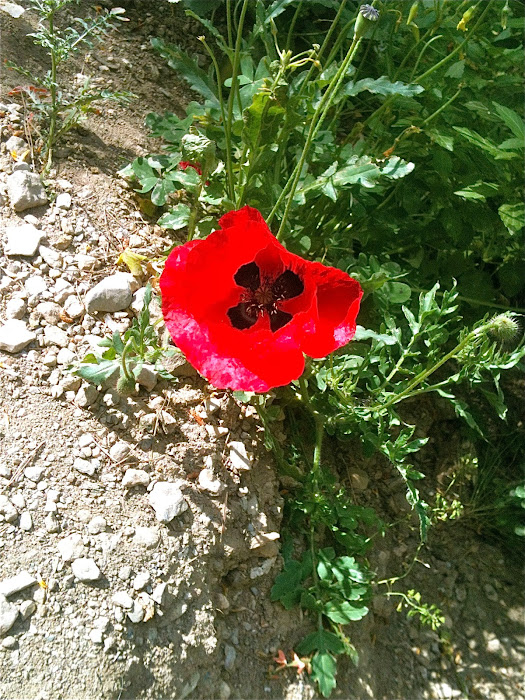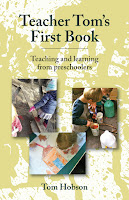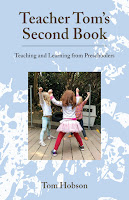We were messing around with pipe cleaners and tissue paper circles. It's a craft-ish project in that most of the kids know, because I showed them. You can make nifty little flowers by sliding the thin disks of paper onto their bendy stems one at a time, giving each one a gentle "crush" as you go. I don't have any pictures of them, but it's a common enough preschool activity that I'm sure most of my readers know what I'm talking about. (But if you want a look, here's a version from my friend Deborah using squares instead of circles.)
Some of the kids do their own thing with the materials available, creating "space ships" and "spiders" and "decorations," but there are always a handful who really, really want to master the flowers. Sarah, I thought, was one of those kids. She plunked herself down at the art table and got to work, brow furrowed, her authoritative chatter letting us know she was on top of things. Since I'd already demonstrated my own technique, I moved on to other things, leaving the art station in the capable hands of a parent-teacher.
Later, while outdoors, I chatted with the parent-teacher, saying something like, "That art project was pretty popular today. Sarah seemed to really like it."
She answered, "It was, but you know, she didn't make a single flower. She couldn't figure out how to get the tissue paper on the stem without tearing it." A huge bouquet of flowers had been created at that table and Sarah had sat there, hands busy for a good half hour. How could it be possible that she hadn't produced a single flower?
"Nope, not one," was the answer, "But she worked really hard. Every time she tried to crush the tissue like you showed them, the paper came off."
I'd not been watching Sarah's production, but only, occasionally, her face and body language. Not once had I seen a sign of frustration or failure. No, the girl I'd seen was hard at work, concentrating, narrating her activities, deeply involved in what I assumed was a manufacturing process like that of the other kids around the table who were making one for "mom," one for "dad," one for "grandma," one for "my pet cat Simon . . ."
"I tried to help her, but she didn't want help. She told me she was already an expert flower maker."
I said, "I guess that means we'd better keep making flowers tomorrow."
The following day, I made the same materials available, not on the art table this time, but on another table, a place where there would be no dedicated parent-teacher. Sarah didn't go there right away, instead choosing a housekeeping game, but before long she was drawn in, taking up a spot, alone with the materials. I sat with her, taking up my own stem, not saying anything. I watched her slide a tissue paper circle onto her pipe cleaner, tearing a huge hole in it during the process. And as had happened the day before, when she crushed it, it came off the stem. This didn't seem to bother her at all as she tossed the wad of paper aside and reached for another. This time she worked more slowly, nudging it along carefully, still ripping the paper too much, but when she crushed it, it stayed, almost balanced in place. Gingerly, she added a second disk of paper, halfway up the stem, then a third.
From an artistic perspective it was a pretty pathetic looking flower. She held it up, no extra pride in her expression, no sign that there was anything amiss, "That's just so beautiful," then stuck in in the glass vase where we were displaying our finished pieces. She then got to work on another.
I put a piece of tissue paper on my stem and in my best imitation of the way she had done it, tore the hole a little too big, then crushing it to keep it precariously fixed in place. Sarah watched me from the corner of her eyes. "No, that's not the way," she said. "You have to do it more gently. Like this," then she showed me on her own flower.
I tried imitating her as best I could. "Good," she said, "That's right. Now, do another one." I followed her instructions.
She made a second flower as pathetic as the first and called it good. Before starting on a third, she watched me for a moment, growing frustrated with my attempts, although I was doing my best to imitate her. She snatched it from me, her voice infused with a false cheerfulness, "Here, let me just do that for you." In her rush, she caused all the tentatively fixed tissue to drop from my stem. "See?" she said, "That's what's supposed to happen. Now you can start over."
I didn't like the feeling of failure the exchange gave me, even as I knew I'd not failed. I knew because I'm an adult and I had practically invented this damn process, yet here I was with the tables turned. This is why I'm not a big fan of crafts in preschool: I worry that we put too many children in this situation. I said, reflexively, "I don't want to start over."
She sighed, "Okay, but you'll never figure it out if you give up."
"That's true." I got back to work, this time making a flower the way I'd initially shown the kids two days before, quickly pulling together a nice, tidy white carnation. Sarah watched me work without comment, then got back to her own stem. When she was finished with yet another pathetic flower, she said, "I think we should plant these in the garden."
I answered, "They would be pretty," then joking, "But, you know, they're not real flowers."
"I know that."
"I think the wind and rain would destroy them. The petals would all fall off."
"Real flowers always fall off," and even as she said it, one of her tissue paper wads fell from the stem she held. "Like that."
It was then that I understood Sarah's flowers. She was not making the perfect little imitation flowers the rest of us were making, but "real" flowers, the kind that bloom, live, then fall away when the winds blow. And in that flash, I was no longer in the presence of the pathetic attempts of a child, but rather what I saw before me were the godlike works of a creator.
******
If you liked reading this post, you might also enjoy one of my books. To find out more, Click here!
"Ready for a book that makes you want to underline and highlight? One that makes you draw arrows and write 'THIS!!!!!' in the margin? Then you are in for a treat." ~Lisa Murphy, M.Ed., author and Early Childhood Specialist, Ooey Gooey, Inc.
I put a lot of time and effort into this blog. If you'd like to support me please consider a small contribution to the cause. Thank you!




